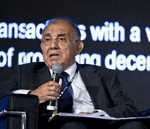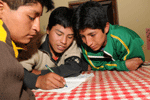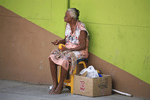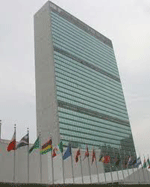Other news
Published on Thu, 2013-11-07 14:26
South Centre presents its view on the Post-2015 Development Agenda and Sustainable Development. The United Nations’ Post-2015 Development Agenda should not simply extend MDGs, or reformulate the goals, but focus instead on global systemic reforms to remove main impediments to development and secure an accommodating international environment for sustainable development. This is a big, ambitious agenda which cannot be acted on overnight. An action plan for systemic reforms could be supplemented, but not substituted, by specific goals in some areas of economic and social development. |
Published on Mon, 2013-10-28 11:26
The 68th session of the United Nations General Assembly (UNGA) ended with renewed commitment to anti-poverty targets and agreement to adopt new development goals in 2015. Women's rights advocates, along with diverse civil society organizations, critically engaged in debates calling for structural transformation that puts human rights and sustainability at the centre of the new development agenda. The 68th session of the UN GA that took place in New York 23-27 September 2013 was the first international inter-governmental process related to the Post 2015 Development Agenda and was intended to set out the formal process for governments to be involved in negotiations around the new development agenda, which have to date been led by the United Nations. |
Published on Thu, 2013-10-24 13:04
There are two major failings in policy interventions in the crisis in the US and Europe – the reluctance to remove the debt overhang through timely, orderly and comprehensive debt restructuring and the shift to fiscal austerity after an initial reflation. These have resulted in excessive reliance on monetary policy, including non-conventional means. However, monetary measures have largely been ineffective in stimulating credit for the expansion of spending on goods and services – hence, the crisis is taking too long to resolve. Moreover, they have created financial fragility not only in the advanced economies practising such policies, but also globally and particularly in emerging economies. Exit from the policy of ultra-easy money is full of pitfalls with attendant consequences for growth and stability. |
Published on Mon, 2013-10-21 13:02
“When you live in a shelter, you face discrimination every day – from the food you eat to the way people treat you in the street, you face discrimination,” began Jose. A homeless shelter resident, Jose spoke at the commemoration of the International Day for the Eradication of Poverty at the United Nations on behalf of homeless people and people living in homeless shelters. This day is commemorated every year on October 17th by International Movement ATD Fourth World. In his message, Jose clearly underlined the essence of the theme this year, “Working together towards a world without discrimination: Building on the experience and knowledge of people in extreme poverty.” |
Published on Mon, 2013-10-14 23:00
On October 17 2013, the International Movement ATD Fourth World will host the commemoration of the International Day for the Eradication of Poverty at United Nations Headquarters. The first celebration was in 1992, when the United Nations declared October 17th the International Day for the Eradication of Poverty. For the last two decades, this day has promoted understanding between people living in poverty and the society at large. The theme for this year will be “Working together towards a world without discrimination: Building on the knowledge of people living in extreme poverty.” One of the most painful aspects of a life in poverty is the discrimination faced by people on a daily basis; their marginalization in the political, economic, and social spheres of their societies, and their lack of voice and representation in the conceptualisation, implementation and evaluation of policies and programmes that affect them directly and indirectly. |
Published on Sun, 2013-10-06 23:00
With no haste, but without pause, the participation of women in the labour market has seen accelerated growth since the 1970s, according to the Panorama Laboral 2012 of the International Labour Organization (ILO). There is a gradual closing of the differences in participation between men and women in the labour force. The participation rate of women in Latin America in 2012 was 49.8%, the employment rate was 40.2% and the unemployment rate 7.7%, while for men the participation rate was 71.4%, employment 59.8% and unemployment 5.6% |
Published on Tue, 2013-10-01 17:27
A Summit of political leaders will be held in September 2015 to adopt the United Nations' Post-2015 Development Agenda. This was decided at a UN General Assembly special event to review the Millennium Development Goals held at the UN in New York on 25 September. To prepare for the Summit and its outcome, an inter-governmental process will be launched in September 2014, at the beginning of the 69th session of the UN General Assembly. "The final phase of the intergovernmental work will culminate in a Summit at heads of states and governments level in September 2015 for the adoption of the post-2015 development agenda," states an "outcome document" adopted during the special MDG event. |
Published on Tue, 2013-09-24 00:00
From 16 till 18 September UN Women convened an expert meeting on the post-2015 development agenda and gender equality in Kenya. Approximately 40 experts with representation from diverse backgrounds contributed to this meeting. A wide range of challenges that the world is facing were discussed, varying from specific topics such as women’s role in sustainable livelihoods, women’s health and violence against women, to more general topics such as poverty, education, economic development, food and natural resources. The expert meeting said to be committed to the attainment of the Millennium Development Goals and the acceleration of their implementation and to the prior commitments in the Beijing Platform of Action. |
Published on Thu, 2013-09-12 00:00
The long awaited work of an experts' committee on sustainable development financing, a key outcome of the Rio+20 United Nations conference, has finally started. The Intergovernmental Committee of Experts on Sustainable Development Financing held its first session on 28-30 August at the UN headquarters in New York. However, contrary to most multilateral discussions and intergovernmental processes in the UN, the session was closed not only to external stakeholders but also the Member States that are not part of the Committee membership of 30 states. |
Published on Wed, 2013-09-11 22:29
We, members and partners of the Asia Development Alliance (ADA) composed of national and sub-national development CSO/NGO platforms in Asia, participating in the 2nd Regional Consultation on Post-2015 development agenda, convened jointly with Global Call to Action against Poverty (GCAP)-Asia in Bangkok, Thailand on 25 August 2013, Recognizing the importance of the Post 2015 Development Agenda as an opportunity and challenge to CSOs in Asia to empower people living in poverty and insecurity to claim their own rights, |












